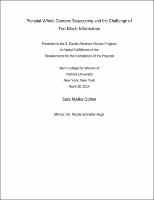Please use this identifier to cite or link to this item:
https://hdl.handle.net/20.500.12202/4208| Title: | Prenatal Whole Genome Sequencing and the Challenge of Too Much Information |
| Authors: | Cohen, Sara Malka |
| Keywords: | Prenatal diagnosis --Moral and ethical aspects. Human gene mapping --Moral and ethical aspects. Nucleotide sequence. Genetic disorders --Diagnosis --Moral and ethical aspects. Human chromosome abnormalities --Diagnosis. DNA --Analysis. Genetic engineering --Moral and ethical aspects. |
| Issue Date: | Apr-2014 |
| Publisher: | Stern College for Women |
| Abstract: | Currently, most prenatal genetic testing determines specific genetic abnormalities for those who have a high risk of inheriting certain diseases or those with an indication, for instance after an abnormal finding on an ultrasound. Sometimes the sample comes from a fetus, as is the case with chorionic villus sampling (CVS) or amniocentesis, and other times, it is from an earlier stage embryo (e.g., with pre-implantation genetic diagnosis (PGD). Comprehensive testing, including testing by microarray and whole genome/exome sequencing, simultaneously assess many genes for the possibility of mutations, in an unbiased fashion. Whole genome/exome sequencing (the focus of this thesis) is a technique gaining popularity in the clinical setting because of advancing technology and decreasing cost. Whole genome/exome sequencing provides data on all genetic sequences, not just specific targeted sequences. Presently, whole genome/exome sequencing is used clinically in the diagnosis of unsolved pediatric conditions and the sequencing of tumors in cancer patients. There are currently many discussions about the ethics of implementing whole genome testing in the prenatal realm. Will all individuals have equal access to this prenatal test? How will the autonomy of the future child going to be ensured? Will children who have had this testing done prenatally be treated differently by their parents? How will whole genome sequencing affect reproductive decisions? This paper will describe where the field seems to be heading and address these and other ethical concerns. |
| Description: | The file is restricted for YU community access only. |
| URI: | https://hdl.handle.net/20.500.12202/4208 https://ezproxy.yu.edu/login?url=https://repository.yu.edu/handle/20.500.12202/4208 |
| Appears in Collections: | S. Daniel Abraham Honors Student Theses |
Files in This Item:
| File | Description | Size | Format | |
|---|---|---|---|---|
| Sara Malka Cohen.pdf Restricted Access | 1.88 MB | Adobe PDF |  View/Open |
This item is licensed under a Creative Commons License

